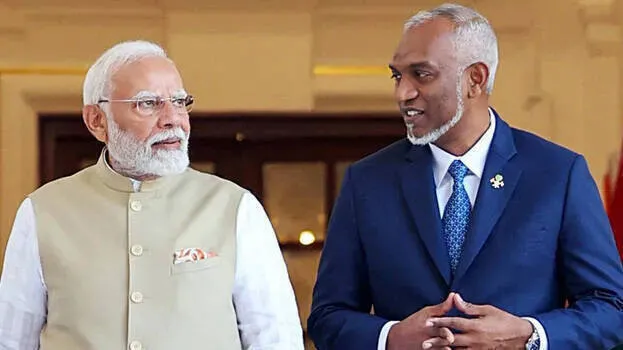

The relationship between India and the Maldives has seen significant ups and downs recently. The "India Out" campaign, promoted under the leadership of President Mohamed Muizzu, who came to power in the Maldives in 2023, demonstrated a strong alignment towards China, causing strain in the Maldives-India relationship. The expulsion of Indian military personnel from the Maldives further deepened this distance. Following this, statements made by Maldivian ministers about Indian Prime Minister Narendra Modi deteriorated the diplomatic ties between the two nations, leading to increased tensions.
In response, Indian tourists began to boycott the Maldives in large numbers. Modi’s visit to Lakshadweep in early 2024 sparked discussions on positioning Lakshadweep as an alternative tourism destination. This development troubled Maldivian ministers, leading them to make negative remarks about Modi, which in turn drew large-scale protests and impacted the Maldivian tourism industry significantly. Until 2023, Indian tourists had consistently been at the forefront of visitors to the Maldives. However, as tensions escalated, the number of Indian tourists to the Maldives dropped by 42%, with India falling to sixth place in tourist arrivals.
Recognizing the risks, the Maldivian government initiated efforts to reconcile with India. Maldivian Tourism Minister Ibrahim Faisal actively sought India's support by organizing tourism roadshows in India and increasing flight services between the two nations. Indian Foreign Minister S. Jaishankar’s visit to the Maldives was viewed as a step toward restoring diplomatic relations.
Further economic cooperation was established with an agreement between the National Payments Corporation of India and the Maldivian Ministry of Economic Development to introduce UPI-based transactions in the Maldives. Additionally, the National Centre for Good Governance signed an MoU to train 1,000 civil servants in the Maldives. Agreements were also signed to collaborate on six other joint initiatives. In a joint press conference, Maldivian Foreign Minister Abdulla Shahid expressed that India has always been a close friend and development partner, to which Jaishankar responded that the Maldives and India are not just neighbours but natural partners.
This diplomatic warmth was followed by an official visit from President Mohamed Muizzu to India on October 7, 2024. He affirmed that despite the "Maldives First" policy, he would prioritize strengthening ties with India. Multiple bilateral agreements were signed, with a focus on cooperation between the two countries. A $400 million currency swap agreement to bolster the Maldives' foreign exchange reserves marked an important step in strengthening financial cooperation. India also launched its RuPay card in the Maldives and helped develop a runway at the Maldives’ Himadhoo International Airport, which Muizzu and Modi jointly inaugurated.
Muizzu’s four-day visit aimed to repair the damage caused by anti-India remarks from Maldivian ministers and to improve strained bilateral relations. Muizzu assured that the Maldives would take no actions that compromise India’s security interests. Modi called the Maldives India’s “dearest friend” and announced that discussions would soon begin on a free trade agreement between the two countries. India also committed to supporting the development of the Thilafushi Port in the Maldives, providing 700 housing units built under the Exim Bank’s buyer’s credit facility as a goodwill gesture.
Sri Lanka’s experience of falling into a debt trap after its pivot towards China stands as a lesson for the Maldives, which has been moving in a similar direction. It appears that the Maldives has started to recognize China’s strategies to establish dominance in the Asia-Pacific region, which could explain its renewed efforts to strengthen ties with India.

(The author is a former president of FOKANA and the founding president of NAAM (USA)).